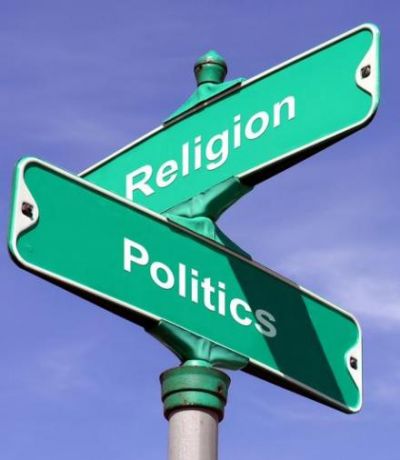“Render unto Caesar what is Caesar, and unto God what is God’s.” – Matthew 22:21
In Matthew 22, the Pharisees ask Jesus whether it is right to pay the imperial tax to Caesar. It is a trick question, attempting to trap Jesus politically into either: A) pledging loyalty to Caesar by answering in the affirmative; or B) calling for revolt against the Roman Emperor by answering in the negative. With his reply in verse 21, however, Jesus evades the trap. He not only demurs, refusing to implicate faith in political partisanship; he also distinguishes between the two.
Jesus’ reply, “Render unto Caesar what is Caesar’s and unto God what is God’s,” establishes faith and political partisanship as two distinct realms. Jesus does not say faith and politics are unrelated — indeed, his sentencing in Pilate’s court and execution a few short chapters later reveal the political implications of faith and the inherent political nature of the gospel. However, his reply in Matt. 22 shows us that while not unrelated, faith and politics are distinct. Faith and political partisanship are to be neither confused nor conflated.
Such conflation and confusion is exactly what is being proposed and debated in President Trump’s executive order “Promoting Free Speech and Religious Liberty” and in the halls of Congress this year. Some leaders are calling for changes to the “Johnson Amendment,” the tax law that prohibits charitable nonprofits — including most houses of worship — and private foundations from partisan electioneering. Churches, charitable nonprofits, and other organizations receive the most highly-valued tax status, benefiting both from tax-exemption and tax-deductible donations. As a condition of this status, these groups agree to refrain from endorsing or opposing candidates.
This language has been law for more than 60 years and has served our houses of worship well. Pastors can of course preach on any issue of the day — political issues, no matter how controversial — without fearing the loss of their tax-exempt status. They and their churches can lead movements, advocate for legislation, and inspire change, as they have done from the Civil Rights era to the present-day Moral Movement (and really, for much longer). They just cannot endorse or oppose political candidates, giving vocal, financial, or other forms of support or opposition. The law only prohibits tax-exempt churches from intervening in partisan candidate campaigns.
The overwhelming majority of pastors (around 90% in surveys) oppose candidate endorsements in church, understanding the divisions that would be sown in their churches, the distraction from their mission, and the dilution of the gospel. Weakening these legal protections could lead candidates and their wealthy donors to pressure pastors to use their pulpits for campaign speech — in other words, to render to Caesar in God’s house.
More than 3,300 faith leaders — clergy and laity — from all 50 states have objected to proposals to change the law through Faith-Voices.org. You can read the text of their message below and add your support for protecting the integrity and independence of the prophetic voice of the church.
Jesus calls us to be political, not partisan — let us follow that call faithfully.
The letter reads:
As a leader in my religious community, I am strongly opposed to any effort to repeal or weaken current law that protects houses of worship from becoming centers of partisan politics. Changing the law would threaten the integrity and independence of houses of worship. We must not allow our sacred spaces to be transformed into spaces used to endorse or oppose political candidates.
Faith leaders are called to speak truth to power, and we cannot do so if we are merely cogs in partisan political machines. The prophetic role of faith communities necessitates that we retain our independent voice. Current law respects this independence and strikes the right balance: houses of worship that enjoy favored tax-exempt status may engage in advocacy to address moral and political issues, but they cannot tell people who to vote for or against. Nothing in current law, however, prohibits me from endorsing or opposing political candidates in my own personal capacity.
Changing the law to repeal or weaken the “Johnson Amendment” — the section of the tax code that prevents tax-exempt nonprofit organizations from endorsing or opposing candidates — would harm houses of worship, which are not identified or divided by partisan lines. Particularly in today’s political climate, engaging in partisan politics and issuing endorsements would be highly divisive and have a detrimental impact on congregational unity and civil discourse.
I, therefore, urge you to oppose any repeal or weakening of the Johnson Amendment, thereby protecting the independence and integrity of houses of worship and other religious organizations in the charitable sector.

